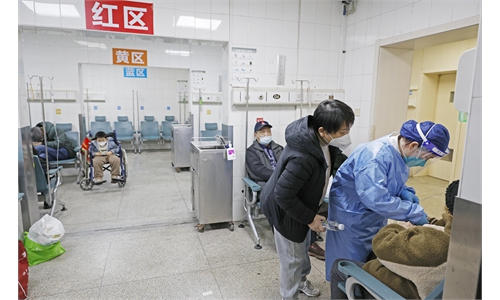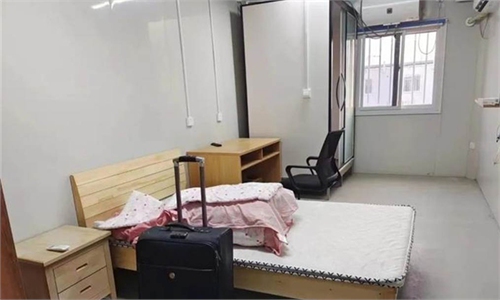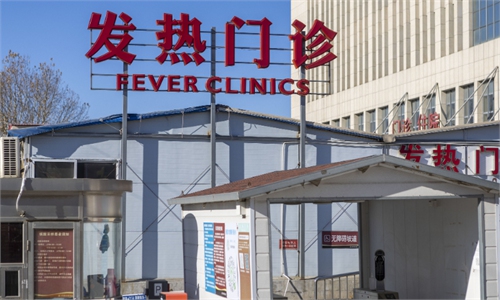IN-DEPTH / IN-DEPTH
Spirit of Bethune integrated into Chinese hospital to safeguard people’s lives, health, and extend international friendship in new era
Inspiring generations
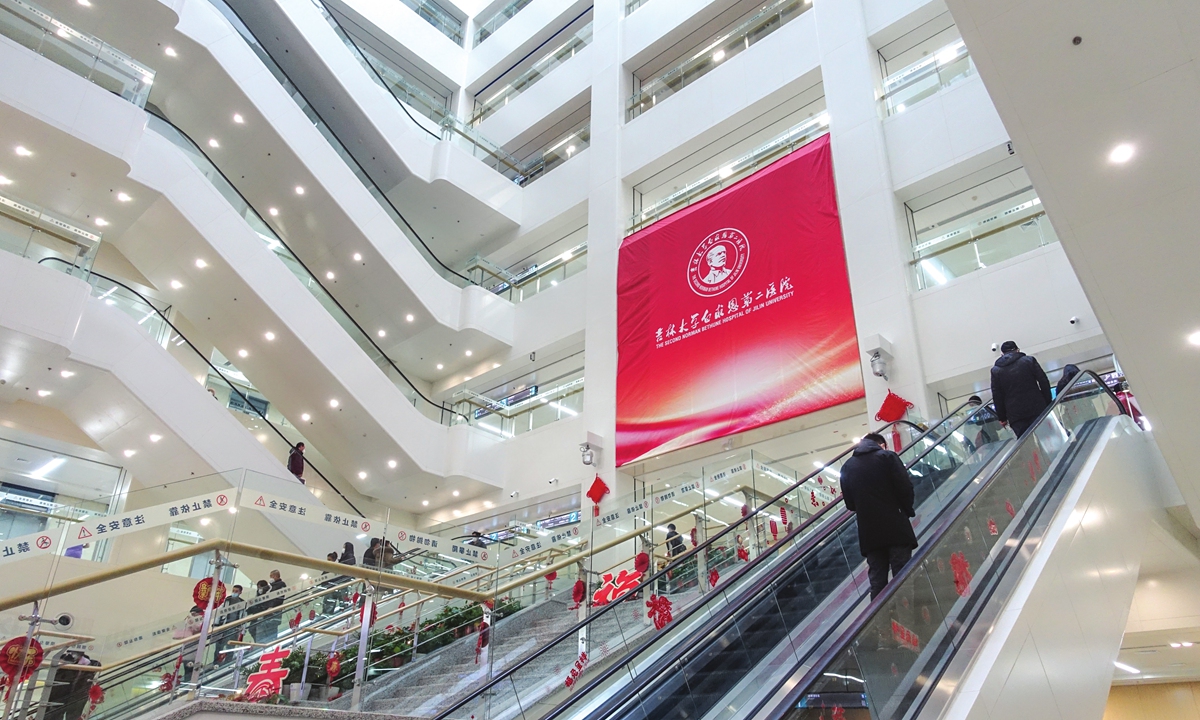
A view of the spacious atrium of the Second Norman Bethune Hospital of Jilin University's Yatai district.Photo: Lin Xiaoyi/GT
"Reader, if you seek a monument, look around."
This epitaph in St. Paul's Cathedral in London also applies to the Second Norman Bethune Hospital of Jilin University (aka Second Bethune Hospital) in Changchun, capital of Northeast China's Jilin Province. The difference is that the hospital is full of life and hope.
Currently, over one month after COVID-19 hospitalizations surged in China, inside the new building of the Yatai district of the Second Bethune Hospital, two-thirds of ward beds in the Emergency Intensive Care Unit (EICU) sit empty, with nurses calmly monitoring patients. In the corridor, several of the admitted patients' family members browse their mobile phones leisurely.
Outside the hospital, Doctor Norman Bethune's statue stands majestically in the snow. People do not need to stop contemplating his glorious deeds, because the Canadian communist's heroism to help save lives during the Chinese People's War of Resistance against Japanese Aggression (1931-45) is widely known, which was even inscribed in the textbook by late Chinese leader Chairman Mao Zedong in a well-known article entitled "In Memory of Norman Bethune."
The connection between Bethune and the Second Bethune Hospital endures through the "Bethunes of the new era" at the hospital, where the spirit of Bethune's tireless and devoted service to the sick lives on in the deeds of the hospital's team of capable doctors and nurses.
Under the banner of Bethune
When you walk into the outpatient building of the Yatai district of the Second Bethune Hospital, you are greeted by a huge two-story red banner bearing the hospital logo featuring Bethune's head portrait. Medical staffers from different departments took turns having photos of themselves taken under the banner in the spacious atrium, which is also their first group shot since the relocation of the workplace at the peak of COVID-19 infections.
In 1954, the Bethune Medical College, founded by Bethune in 1939, in the now-defunct Shanxi-Chahar-Hebei military region, was released to Changchun, becoming the predecessor of the Norman Bethune Health Science Center of Jilin University and its three affiliated Bethune Hospitals. Since its inception, carrying forward the Bethune Spirit has become the belief of many medical professionals in northeastern China.
On January 26, 2020, when most Chinese people were still immersed in the celebratory atmosphere of the Spring Festival holidays, Qin Yanguo, president of the Second Bethune Hospital, led a medical team to assist Wuhan, Central China's Hubei Province, to fight against the coronavirus.
"When communicating with medical teams from all over the country in Wuhan, everyone was impressed and expressed their admiration when they learned that our team was from the Bethune Hospital," Qin told Global Times.
"Go to the frontline, to the place where the fighting is fiercest." This was Bethune's fervent request after meeting Chairman Mao in 1938 in Yan'an, the sacred place where China's revolution in Northwest China's Shaanxi Province developed. That year, Bethune traveled thousands of miles to China, spending 513 days in the Shanxi-Chahar-Hebei border area, treating a large number of critically injured soldiers and local people, with a record of performing operations on a record 115 patients for 69 consecutive hours.
"Use me like a machine gun," which is a classic quote from Bethune in China. While on the frontlines of the fight against the COVID-19 epidemic, medical staffers at the Second Bethune Hospital were undoubtedly the fiercest "machine guns" too.
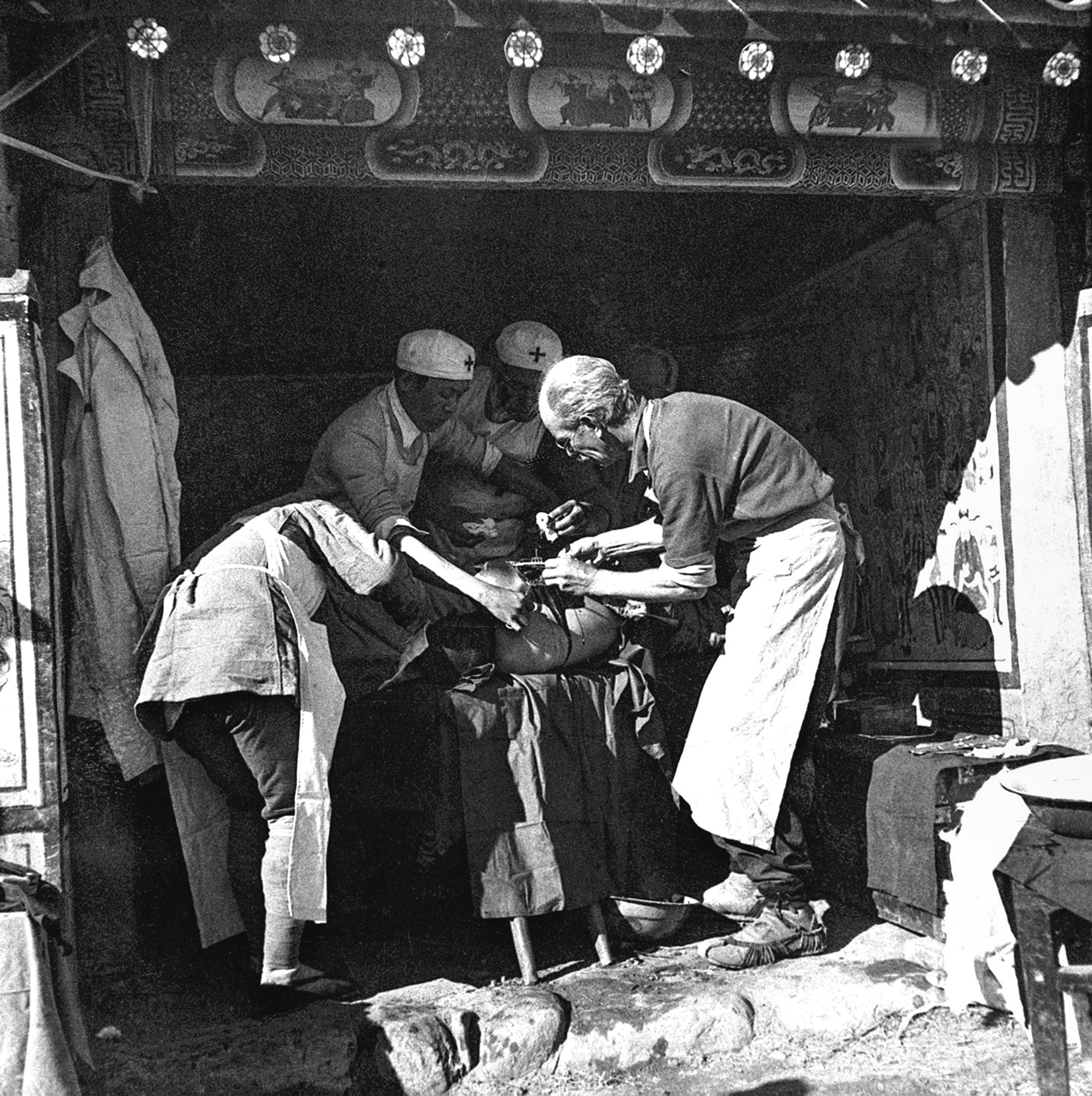
File photo: Norman Bethune operates on the wounded in a makeshift operating room in the Shanxi-Cha-Hebei border region in October 1939. Photo: Xinhua
At the end of December 2022, as China optimized its COVID prevention and control policies, the hospital leadership accurately predicted the epidemic situation and completed relocation to the new hospital site within two weeks."It took us just half a day to move the emergency and intensive care units. On December 25, the day of the relocation, we immediately treated 631 emergency patients," Yin Yongjie, director of the Department of Emergency and Critical Care Medicine at the hospital, told the Global Times.
Faced with a rapidly increasing caseload of patients at the end of December 2022, the hospital took the lead in implementing the "one hospital one bed" model, breaking the boundaries between medical disciplines and making every effort to treat patients infected with coronavirus.
Yin noted that, since moving into the new hospital district on December 25, a total of 17,812 patients have been treated in the emergency department, and 161 patients have been treated in the intensive care unit (ICU), among which 12 have been treated with ECMO. As of January 28, 5 had been discharged, 7 had been evacuated from ECMO, and 3 were still receiving ECMO treatment.
In 2020, while assisting in Wuhan, the medical team from the hospital set a record for treating the oldest surviving COVID-19 patient in China with ECMO.
According to the field investigation feedback by the national COVID-19 prevention and control mechanism inspection team, the hospital's Department of Emergency and Critical Care Medicine has received the highest proportion of critically ill COVID patients in Jilin Province, and even in the entire Northeast China.
"We have not turned away a single patient; not a single person has been denied treatment because of the lack of a bed, and until now, not a single complaint has been lodged," Song Debiao, deputy director of the Department of Emergency and Critical Care Medicine at the hospital, told the Global Times.
Turning a new page
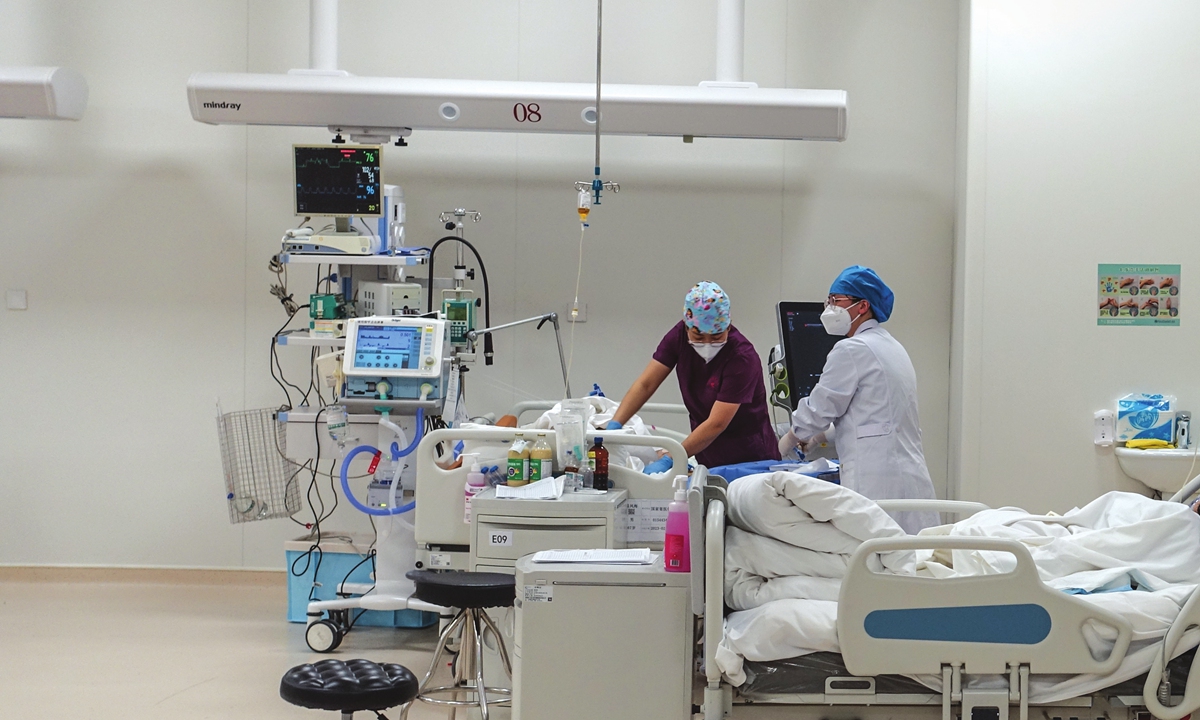
A doctor and a nurse treat a patient in the fully equipped EICU at the Second Norman Bethune Hospital of Jilin University on February 4, 2023. Photo: Lin Xiaoyi/GT
Walking through the EICU, one would found it is noticeably empty and quiet except for the few patients and the doctors' gentle, detailed inquires while on their rounds.
"The number of patients at the emergency department significantly fell after reaching its peak on January 5," Song said, pointing out that most of the hospital's departments have resumed normal operations.
Liu Tiecheng, 81, who was about to be released from the ICU, was excited to take off the oxygen tube inserted into his nose to speak to the group of reporters with cameras and tape recorders visiting the ward.
"When I was unconscious, the nurses here helped me relieve myself manually and helped wash my hair. I am happy to see a new knowledgeable, high-quality, revolutionary medical team growing in this new era," he told the Global Times.
When fighting the COVID-19, Chinese medical workers upheld the Bethune Spirit of excellent patient care through tireless and selfless dedication, making significant contributions to safeguarding people's health, Qin said.
"From this we have also learned many valuable lessons. The Chinese people are now well prepared to face any sudden public health event in the future," he stressed.
On January 28, the first work day after the Spring Festival holidays, Jing Junhai, secretary of the Jilin Provincial Committee of the Communist Party of China (CPC), paid a visit to the frontline medical workers at the Yatai district of the Second Bethune Hospital.
Jing encouraged medical workers to enhance their professionalism and professional capability, and rapidly beef up their professional knowledge to ensure that people's health is comprehensively guaranteed.
By the end of the COVID-19 infections peak, it became obvious that people are paying more attention to their own health. In the past, Chinese people did not like to visit hospitals in the first month of the lunar year because they thought it was a bad omen, but this year, before the Lantern Festival [on February 5], many patients actively came to hospitals for consultations, Liu Tongjun, director of the hospital's General Surgery Department, told the Global Times.
"In the process of communicating with patients, I also felt that patients had more trust in us," Liu said.
Qin noted that at present, the Chinese government has attached greater importance to health in social development, and is making greater efforts to ensure that public health is a strategic priority for development.
"Presently, we are gradually changing from a focus on treating diseases to a focus on protecting people's health. It is not only a change in philosophy, but also a change in our overall treatment protocol," he said.
At present, the Second Medical School of Jilin University focuses on treating senior citizens, young children, and women. It carries out extensive health-related information dissemination campaigns while designing distinct physical examination projects for these key groups to facilitate the early prevention and early screening of diseases. It also opens special outpatient clinics for rare, difficult diseases to further improve the quality of healthcare services.
Qin set 2023 as the year of discipline development for the hospital.
"The struggle against the epidemic has also equipped Chinese doctors to face academic bottlenecks. We will take advantage of a hospital affiliated with a comprehensive university to attract and train more outstanding talent and strive to make more breakthroughs in core medical technologies in the future," he said.
Loving care without boundaries
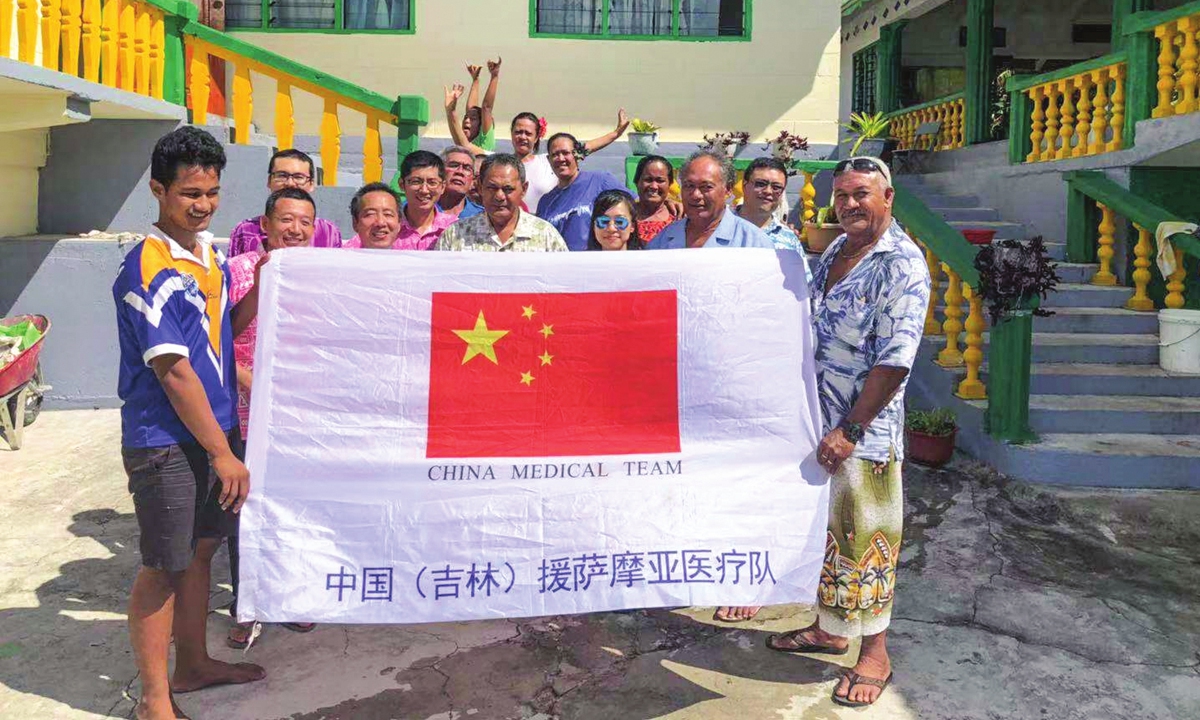
A group photo of the second Chinese medical team dispatched to Samoa during a voluntary clinical treatment camp in Manono Island. Photo: Courtesy of Zhang Jichang
It was 3 pm when Zhang Jichang, deputy director of the hospital's Cardiovascular Medicine Department, talked to the Global Times.Zhang had just finished three surgeries and arrived in a hurry with a green surgical gown under his jacket.
Zhang, a somewhat shy man, didn't spiel until he started talking about the Chinese medical team sent to Samoa. The experience, similar to Bethune's, allowed him to work and sow seeds of hope in a country thousands of miles away, and made him feel deeply honored.
From January to August 2019, Zhang spent seven unforgettable months in the South Pacific island nation as the team leader of the second Chinese medical team dispatched to Samoa along with five of his colleagues. While in Samoa, they completed the first sinus surgery, the first combined radical thyroid cancer surgery, and the first cardiac ultrasound examination, all of which filled pre-existing gaps in Samoa's medical history. They traveled to industrial and agricultural bases and remote islands to provide voluntary clinical treatment and medical knowledge promotions and also successfully completed the Pacific Games' healthcare mission.
In addition to directly being involved in clinical care in Samoa, Zhang and his team also thought about "how to build a permanent professional medical team in a limited time."
"After we arrived in Samoa, we found that although many countries had provided medical supplies to Samoa, the country had very few specialized doctors equipped to use the equipment. Therefore, one of our important tasks there was to write the instructions for the drug administration and equipment operation. We also trained local doctors to maximize the use of unutilized medical equipment," Zhang said.
Tropical Samoa is humid and sultry. "The wooden houses we lived in would leak when the rainy season arrived, and there were frequent earthquakes," Zhang said. He noted that he felt uncomfortable when he first arrived, but as he became more involved with the local people, he fell in love with the land.
"At first, local people would ask us if we were Japanese, but later, they would even speak a few words of Putonghua and even learn tai chi from us," Zhang recalled.
In 2018, Jilin Province dispatched the first batch of medical teams to Samoa, and as of January 2023, the province has sent a total of seven batches with a total of 48 members to Samoa to carry out medical aid missions.
"Every time the hospital has notified the selection of members of the medical team, many of our staff members actively and carefully prepares for the examination," Zhang said.
This year marks the 60th anniversary of the occasion when China sent its first medical aid team abroad. Over the past six decades, the country has sent medical teams consisting of 30,000 members to 76 countries and regions globally, providing 290 million diagnoses and treatments to local people.
There is also a statue of Bethune in Jilin University, and every year, the school's new medical students and incoming medical staff recite Chairman Mao's "In Memory of Norman Bethune" in front of the statue, Zhang said this is his original aspiration.
"We are glad that now, in the new era, more people have inherited the Bethune Spirit to better serve more people with their medical proficiency and medical ethics in the land that he loved," he said.
